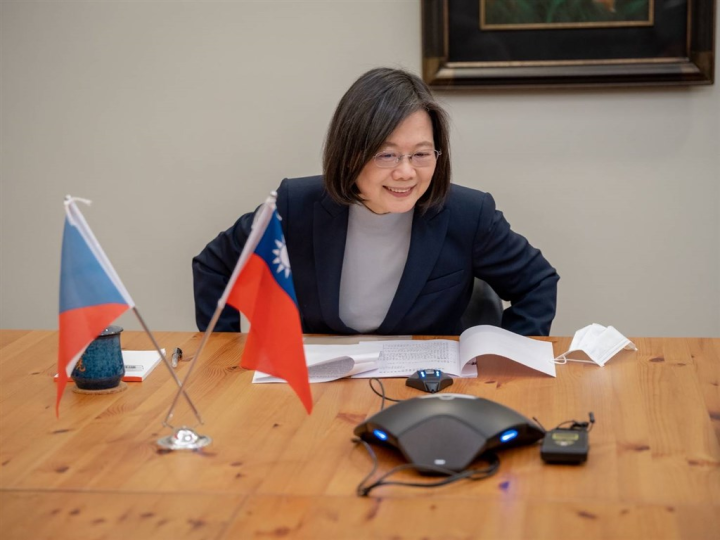
Taipei, Jan. 30 (CNA) President Tsai Ing-wen (蔡英文) extended the congratulations of Taiwan's government and people to the newly elected president of the Czech Republic, Petr Pavel, during a teleconference, the Presidential Office said Monday.
In a rare call to a president-elect of a country that does not have diplomatic ties with the Republic of China (ROC), Taiwan's official name, Tsai said the people of Taiwan and the Czech Republic enjoy deep ties and share the values of freedom, democracy, and human rights, according to Presidential Office spokeswoman Lin Yu-chan (林聿禪).
Based on these cordial ties, the government of Taiwan looked forward to deepening exchanges and cooperation with the Czech Republic in key areas, including semiconductor design, talent cultivation in cutting-edge technologies, and supply chain restructuring, according to Lin.
Tsai also said Taiwan will continue to encourage more Taiwanese businesses to use the Czech Republic as a regional base to engage with Central and Eastern Europe, Lin said.
President-elect Pavel thanked Tsai for her congratulatory message while saying that he looked forward to even closer exchanges between the two sides in various fields in his upcoming tenure.
Pavel also said the Czech Republic stood firmly on the democratic side and supported Taiwan to maintain its vibrant democracy without the coercions of authoritarianism, according to the spokeswoman.
The teleconference began at 6 p.m. Taipei time and lasted for about 15 minutes, with Foreign Minister Joseph Wu (吳釗燮) present, Lin said.
Prior to the phone call, Taiwan's representative office in the Czech Republic sent a congratulatory message from Tsai to the Pavel camp after his victory Saturday, according to a Ministry of Foreign Affairs (MOFA) press release.
Political leaders in countries that recognize Beijing instead of Taipei normally avoid having direct contact with ROC presidents to avoid angering the People's Republic of China.
The last time President Tsai made public a phone call with a leader of a non-ally was on Dec. 2, 2016, with then U.S. President-elect Donald Trump.
Pavel, a retired general and former chairman of NATO's military committee, the alliance's highest military body, swept to the Czech presidency after a decisive victory on Saturday over former Prime Minister Andrej Babiš.
The 61-year-old took 58.32 percent of the vote, results released by the state statistics office showed.
The ex-general will replace Milos Zeman, whose second term ends in March.
Unlike Zeman, who long pushed for closer relations with China and Russia, Pavel is considered a mainstream pro-Western candidate who backs aid for Ukraine.
Though the president of the Czech Republic is the head of state, the position has only ceremonial powers as the day-to-day business of the government is carried out by the prime minister.
In a previous interview with the public Czech Radio, Pavel said he would support his country's links with Taiwan, a major investor in the Czech Republic.
Pavel said the one-China policy should be supplemented with a "two-system" principle.
"There is nothing wrong if we have specific relations with Taiwan, which is the other system," Pavel said.
"It is definitely in our interest to retain active business and maybe also scientific relations with Taiwan," he said.
Despite the lack of diplomatic ties, Taiwan and the Czech Republic have maintained cordial relations since the two sides opened representative offices in 1991 and 1993 in Prague and Taipei respectively.
Bilateral relations have warmed since Czech Senate President Miloš Vystrčil visited the country in September 2020, becoming the first head of a lawmaking body from a non-diplomatic ally to address Taiwan's Legislative Yuan.
He did it despite repeated warnings from China, which considers Taiwan part of its territory.
The Czech government's Indo-Pacific strategic policy framework published last year emphasized that Prague will develop bilateral relations with like-minded nations in line with the rules-based international order, and it regarded Taiwan as a major partner in its future Indo-Pacific strategy.